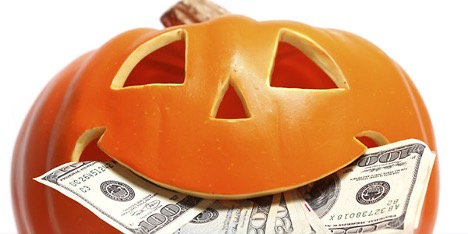
October is the month of Halloween, which means dressing up, scaring one another, and enjoying some treats. However, October is also a SPOOKY month for other reasons, no pun intended.
In the past, October has been known to be the worst month for the market. The October Effect is a known term in finance. It’s a “perceived market anomaly that stocks tend to decline during the month of October” (Hayes, 2020). Why do people still believe in this superstition you might ask? There are many reasons.
Well, in 1907 there was The Bank Panic. It was “a financial panic that threated to engulf Wall Street, mostly owing to threats of legislative action against trusts and shrinking credit” (Beattie, 2021). When did that panic take place, you may ask? In the month of October. In 1929, the Stock Market crashed. This began on October 24th and “was a bloodletting on an unprecedented scale because so many people had money invested in the market. It left several "black" days in the history books, each with their own record-breaking slides” (Beattie, 2021). In 1987, Black Monday happened on October 19th. It was an unexpected stock market crash because of the automatic stop-loss orders and financial contagion (Beattie, 2021). The most recent instance is October 2008, when there needed to be a Wall Street bailout package because of the Financial Crisis (Singh, 2021).
However, although the above can be quite convincing, many can say that October is just a regular month. Apparently, September actually has more historical down markets than October (Beattie, 2021). The catalysts for 1907 and 1929 were in September or even earlier (Beattie, 2021). The tension building over the fate of trust companies in 1907, could have happened at any time (Beattie, 2021). People argue that the 1929 crash began when the Fed banned margin-trading loans. This happened in February and increased interest rates (Beattie, 2021). Another day in September was the original “Black Friday” which occurred on September 24, 1869 (Beattie, 2021). Speculators tried to corner the gold market while working with the Treasury, but the price rose until it dropped and sparked a crash (Beattie, 2021). Black Wednesday was on September 16, 1992. This is when “the collapse in the pound sterling forced Britain to withdraw from the European Exchange Rate Mechanism (ERM)” (Kenton, 2019). The ERM had set low limits and the pound was depreciating and was falling close to those limits (Kenton, 2019). In September 2001, the attacks on the World Trade center had a huge single-point decline in the Dow (Beattie, 2021). In September 2008, there was the Financial Crisis because of the subprime mortgage meltdown which led to a single-day point decline in the Dow as well (Beattie, 2021).
So, what did we learn? The October Effect is more psychological and as always, the stock market is volatile and no real financial events cluster as any given point (Beattie, 2021). So, let’s leave the spookiness to the only real spooky event in October, Halloween.
Referemces:
Beattie, A. (2021). Why October Is the Month of Market Crashes. Investopedia. https://www.investopedia.com/articles/financial-theory/09/october-effect.asp
Hayes, A. (2020). October Effect. Investopedia. https://www.investopedia.com/terms/o/octobereffect.asp
Kenton, W. (2019). What Was Black Wednesday? Investopedia. https://www.investopedia.com/terms/b/black-wednesday.asp
Singh, M. (2021, August 29). The 2007-08 Financial Crisis in Review. Investopedia. https://www.investopedia.com/articles/economics/09/financial-crisis-review.asp
